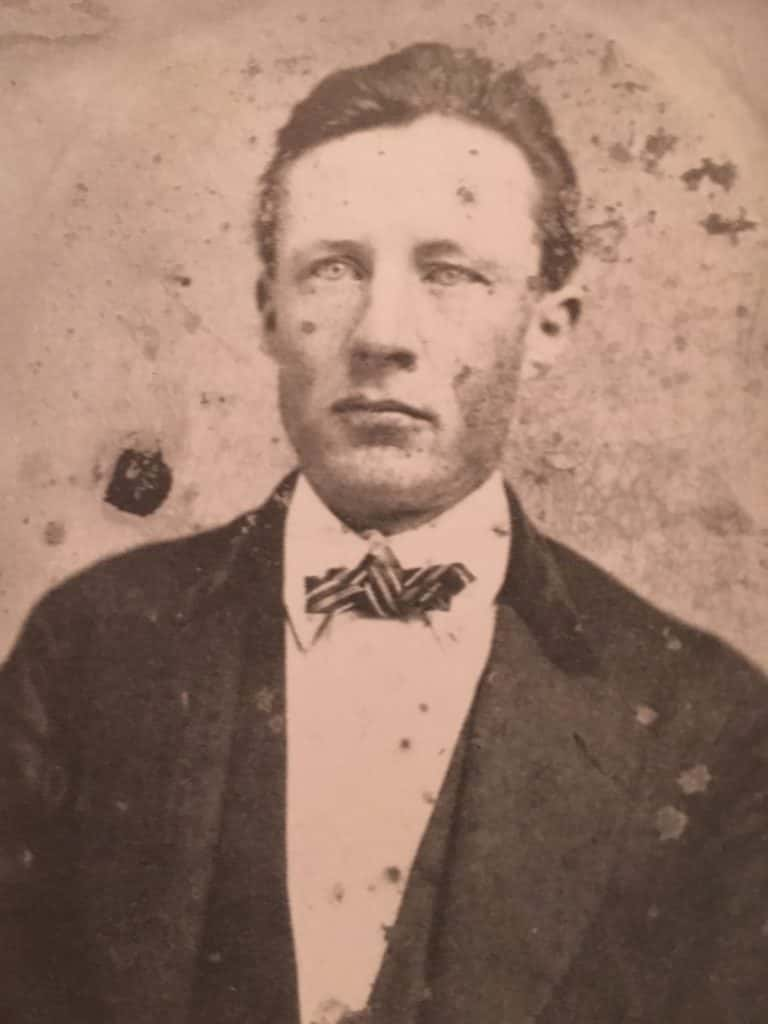Old Uncle Tom:
Tom Brown
Written by Justin D. Lamb

Tom Brown was a man in which students of Marshall County never forgot and just a mention of his name would quickly bring back memories of their school days. Due to his strict disciplinarian methods, many children were in great fear of the man known as “Old Uncle Tom,” but as they grew older they came to develop a great sense of admiration and respect for their former teacher.
A native of Stoddard County, Missouri, Thomas David Brown was born on March 1, 1852 to Dave and Muzella Brown. Brown’s father had a crippled hand which led him to drink most of his adult life away, and on one occasion, Dave Brown’s drinking became so bad he sold off the family furniture in order to get enough money for liquor. After being rejected from the Confederate army due to his disability, Dave Brown joined Quantrill’s Raiders and rode with the band as they bushwhacked in Missouri and Kentucky throughout the war.
Following the conclusion of the Civil War, Dave Brown’s drinking problem became increasingly worse leading his son to abandon his bad home life and make his way to Kentucky. A young Tom Brown rode a mule from Stoddard County, Missouri until he reached western Kentucky where he eventually settled in Benton. Tom enrolled in school for two years and “ate burnt sorghum and cornbread in order to make a living and to pay for his education.” Not long after, he met a Marshall County girl, Sarah Jane Lee, who was a direct descendant of General Robert E. Lee and the two soon married. Tom finished school after two years and began teaching in the local one-room schools throughout the countryside at Benton, Olive, Walnut Grove, Salem, and Briensburg.
In the classroom, Tom Brown set a high standard for his students and demanded strict order. On one occasion when two of his pupils threw a nail down a third boy’s shirt, Tom Brown saw the commotion and yanked up all three students by the collar of their shirts and whipped them all while continuing his lecture on the day’s arithmetic lesson. Brown always kept his switch handy throughout the school day and even the slightest infraction would be punished with harsh licks from the switch.
Several of the older boys in his class were well-built farm boys who many of the other teachers in the county were afraid to discipline. That wasn’t the case for Old Uncle Tom. “He was known to whip the big boys and grown men who other teacher may been afraid to punish,” recalled his grandson Ed Brown in 1990 interview. Brown taught several young men who went on to become successful attorneys and judges in Marshall County including Elbert Lawrence Cooper, Jack Fisher, Mike Oliver, and Judge Joe L. Price and nearly all of them accredited Brown for fostering their education. “People gave him credit for being a strict disciplinarian, but many came back to tell him that they wouldn’t have learned anything if it hadn’t been for ‘Old Uncle Tom’.”
Tom Brown was the father of nine boys and one girl and demanded respect and discipline at home as well. “The children could not speak at the table, and if they did, they were asked to leave were not allowed to finish their dinner,” recalled Ed Brown. “And when Poppa Brown beckoned, his children came running or else suffered the switch.”
One of Brown’s older sons, Charlie, was the bravest and most rebellious of the ten children and tended to push the line with this father as often as he could. On one occasion, Charlie was not getting out of bed as early as his father had wished, so Tom Brown got a full dipper of cold water to motivate his son. However, Charlie was one step ahead of his father and when he heard him coming down the hall, he stuffed pillows under the blankets on the bed and jumped out the bedroom window. “It really angered Poppa Brown when he threw the dipper of cold water and it landed on the bed instead of Charlie,” recalled Mrs. Mary Waid, the only daughter of Tom Brown, in a 1990 interview.
According to Mary Waid, she only ever recalled her father smiling once. “Charlie had fallen into the pond after unsuccessfully trying to walk across the thin layer of ice. Poppa Brown laughter and told mother that their monkey had fallen in the pond. “But just because their father was strict didn’t mean there was no love for his family because the children often recalled good times the family enjoyed. “Mother loved to fish but Poppa Brown hated it. But every year on May 1 after planting the watermelons, he would hitch up the wagon and take us children fishing.”
Old Uncle Tom Brown died on April 30, 1921 and was buried in the Hiett Cemetery on Dogtown Road. A monument was erected in his honor by many of his former students which reads, “Erected to the memory of Thomas D. Brown, teacher, by more than 150 of his surviving pupils.”






